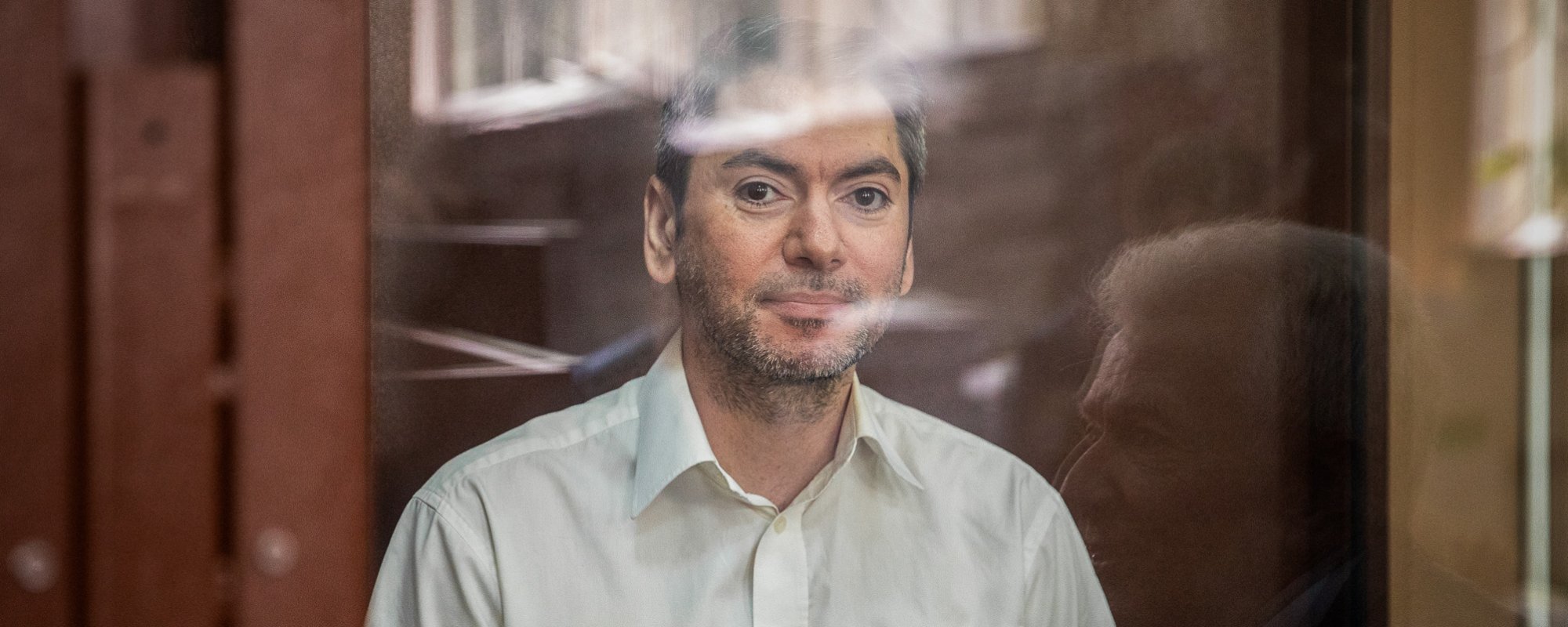Persecution of voters’ rights activists, beating of a person suspected of insulting religious feelings, sentencing of Alexei Navalny and Daniel Kholodny under the case of an extremist community — OVD-Info highlights the main news of August in our chronicle of political pressure.
Persecution Due to an Anti-War Position

 In August, Russian authorities continued to put pressure on citizens speaking out against the war with Ukraine. Thus, the «Peaceful Resistance» organisation’s activist Olga Smirnova was sentenced to six years in prison for posts about the bombing of Ukrainian cities and deaths of civilians.
In August, Russian authorities continued to put pressure on citizens speaking out against the war with Ukraine. Thus, the «Peaceful Resistance» organisation’s activist Olga Smirnova was sentenced to six years in prison for posts about the bombing of Ukrainian cities and deaths of civilians.
An elderly woman, 61-year-old Natalya Filonova, was sentenced to two years and ten months in prison for protesting against mobilisation. Her family also faced persecution: the woman’s adopted son, who ended up in an orphanage after Filonova’s arrest, spoke of bullying and physical aggression.
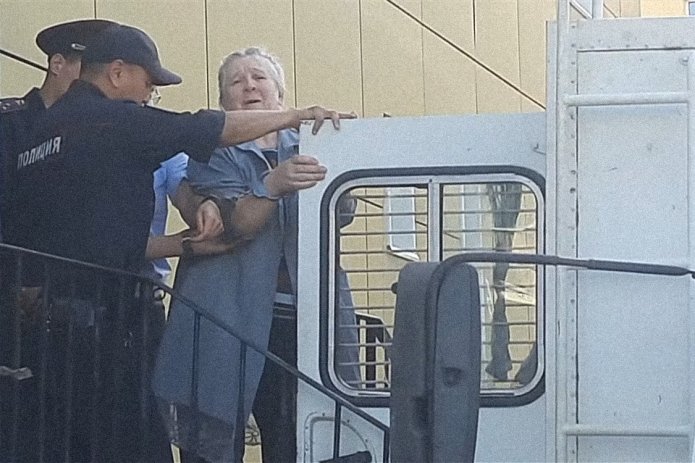
In the Kaliningrad region, the disabled mother of anti-war activist Igor Baryshnikov died. Baryshnikov was previously sentenced to seven and a half years in prison for spreading «fake news» about the Russian army. OVD-Info told the story of his persecution.
Nine administrative cases were opened against Tamara Kryukova, a civil activist from Magadan, the historical outpost of the most brutal Soviet gulag. , The cases include charges for discrediting the army and public calls for terrorism. Kryukova’s support group believes that she is trapped in an «arrest carousel» — a series of administrative arrests during which prisoners are persecuted to obtain information for a criminal case. OVD-Info details this new practice in infographics prepared by lawyer Ivan Vtorushin.
OVD-Info maintains and regularly updates infographics about people who have faced criminal prosecution because of their anti-war position. You can find out how anti-war repressions developed from July 22 to August 21 of this year in our Persecution of the Anti-War Movement Report.
Golos Persecution
Founded in 2000, Golos (Movement for Defence of Voters' Rights) has been following elections and protecting voters' rights for many years. In 2011, Golos launched the «Violations Map, ” a project that allowed voters to report irregularities and fraud during the State Duma elections. Evidence of widespread violations catalyzed major protests.
Back then Golos faced pressure from the authorities. For example, a crew from the State-owned TV channel NTV broke into the association’s Moscow headquarters while working on the film «Voice from Nowhere, ” created to discredit the work of those following elections and advocating for voters’ rights. In 2013, the association became the first company deemed a „foreign agent“, and in 2016 the Presnensky Court in Moscow dissolved it at the request of the Ministry of Justice. Golos’ team, however, continued the movement’s work under the same name.
Amendments to the «foreign agency» legislation allowed the authorities to continue persecuting Golos participants. Thus, in August 2021, the Ministry of Justice included Golos in the «Unregistered Public Associations — Foreign Agents» register, and a little more than a month later recognized 16 participants of the movement as foreign agents.
Since the full-scale invasion, the movement’s website has been blocked as part of military censorship, and many of its participants were searched after being accused of discrediting the army. Despite the fact that a criminal case was opened against Mikhail Gusev, an election tracker and voters’ rights activist from Ivanovo, searches were carried out on movement participants all over the country.
In addition, the police initiated several administrative cases against election trackers and voters’ rights activists for participation in the activities of an «undesirable» organization. They were charged for their connection to the European Network of Election Observation Organizations (ENEMO), which the Prosecutor General’s Office recognized as «undesirable» in September 2021. Immediately after the ban on ENEMO, Golos suspended its membership in this organization. As evidence in one of these cases, the police cited a «letter from the dark web.»
On August 17, in several regions across the country, the homes of Golos' members were searched due to a criminal case regarding collaboration with an «undesirable» organization. The movement’s co-chairman, Grigory Melkonyants, was sent to jail as a suspect.
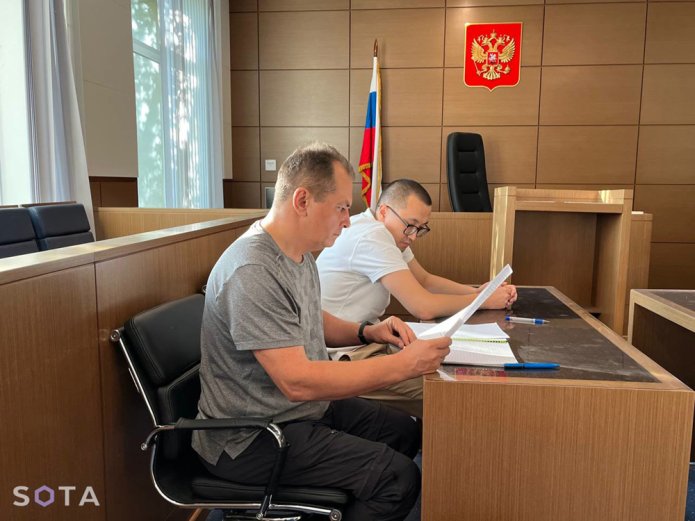
Andrei Buzin, the former head of Golos, connects the increased pressure on Golos with the upcoming regional elections, which are scheduled to take place on September 10. In addition, he considers the criminal prosecution of movement participants to be revenge for their work: «There is sediment in the Kremlin’s blood. It will purge all dissenters, regardless of their beliefs and sentiments, including election trackers and voters’ rights activists.»
Repressive Lawmaking
This month Vladimir Putin signed laws that introduced liability for participating in foreign and international organizations that are not included in the special register by the Ministry of Justice. Now for a single «violation» individuals may be fined for up to 50 thousand rubles (US$520), and government officials are liable for up to 100 thousand rubles (US$1,040). If someone is charged twice, they may be sentenced to up to 3 years in prison.
After the law was signed, the program «Children of War» («Deti Voiny») in Penza, a city in the European part of Russia, was closed. This program was helping elderly people who were affected as children by the actions of Nazis. The director of the political alliance «Civic Union» («Grazhdnanskiy Soyuz») in Russia attributed this to the tightening of legislation about cooperating with foreign NGOs: the program was sponsored by a federal German foundation «Memory, Responsibility, and Future» («Pamyat. Otvetstvennost. Buduschee.»), which provides financial compensation to forced laborers and those affected by injustices during the National Socialist period.
«Foreign agents» and «Undesirable» Organizations
«Foreign agents»

The Ministry of Justice made three additions to the register of «foreign agents» in August, including RS-Balt, the founder of the news agency RosBalt, which was declared a «foreign agent» in 2021. Since then, the company dissolved itself due to difficulties connected with this status.
Recently, «foreign agents» have been more frequently charged not only due to the absence of or «mistakes» in appropriately marking their publications and oral statements as those given by «foreign agents, ” but also for failure to report. This month OVD-Info found out about five such charges and five fines.
«Undesirable» Organizations

Polish anti-war association «For Free Russia» («Za svobodnuiu Rossiiu»), journalists with Conflict Intelligence Team, Ukraine-based religious movement «Allatra», and Belgian Wilfried Martens Center of European Studies, center of indigenous peoples’ development «Uralic» and the Free Buryatia Foundation were declared «undesirable organizations» in August 2023.
It was reported in August, that two Pentecostal pastors, Nickolai Utilin and Sviatoslav Yugov, were sentenced to three and a half years prison sentence for cooperation with a Christian organization in Kyiv, called «New Generation» («Novoie Pokolenie»). The president of the Mixed Martial Arts Federation in Yaroslavl, a major city in central Russia, Denis Shibankov was sentenced to 300 hours of community service, due to alleged cooperation with the Falun Gong new religious movement, also deemed as «undesirable» by the Russian government.
Freedom of Speech
Cases of Calls to Terrorism or Extremism
It was reported in August that a new case was brought against mathematician and anarchist Azat Miftakhov. Just before his previous sentence was coming to an end (based on a broken window in the office of the pro-government political party «United Russia»), a new case was initiated for terrorist propaganda. This time it was due to a comment he allegedly made when watching TV with other prisoners. Law enforcement officers insist that Miftakhov «expressed his approval» of an explosion made by Mikhail Zlobitsky in the FSB office in Arkhangelsk, a city in the far north city. He was moved to a pre-trial detention center in early September, a day after he was released from prison.
Prokhor Neyzhmakov, born in Lugansk (a city in the Donbas region of Ukraine), found himself in a temporary living facility in Vladimir Oblast in Central Russia when the full-scale invasion started. He was recently sentenced to three years in prison seemingly due to messages that he sent to a chat on social media. These include: «You are destroying my country», «How many husbands and brothers have been murdered in these conflicts, if you had stayed out of Ukraine, everything would have been fine, you would be neighbors», «Say thank you to uncle-Volodka (referring to Vladimir Putin), thanks to whom I don’t have a home, education and everything else», «We will not negotiate with Putin…overthrow him and then we can talk».
Criminal Cases Related to the Article on the “Rehabilitation of Nazism” and Damage to Symbols
A criminal case was initiated against the libertarian blogger Mikhail Svetov for the rehabilitation of Nazism because of the song «Ah, Bandero, Ukrainian Apostle!», which he sang on one of his streams on social media in September 2021. In Tatarstan, a republic in western Russia, a case was initiated citing the same accusation against a man who burned wires at the Eternal Flame to sell them for scrap metal, and in Nizhny Novgorod, a large city in western Russia — against an anti-war activist Mikhail Zharikov, who has been in a pre-trial detention center since July for spreading ‘fake news’ about the army. He was charged with commenting on the role of the Russian Liberation Army (ROA) in the liberation of the Czech Republic.
Insulting the Religious Feelings of Believers
Nikita Zhuravel is accused of insulting religious feelings because of a video in which he burns the Koran. He said that he was beaten in a pre-trial detention center by Adam Kadyrov, the son of the head of Chechnya, Ramzan Kadyrov. The leadership of Chechnya later confirmed this fact. Chairman of the Parliament of the Chechen Republic, Magomed Daudov, commented on the beating: «Adam is the flesh of the great Kadyrov family. He worthily continues the traditions of a defender of the Motherland and an uncompromising fighter against evil!»
Freedom of Assembly
Detentions at rallies and their consequences
In August, residents of Russian cities continued to hold individual protests against the war and in support of political prisoners. Many of them were detained.
In addition, in August, associates of Igor Girkin, a prominent Russian nationalist and military commander, were detained, as well as teenagers who turned over portraits of dead leaders of the Wagner Group, a federally funded private military company in Russia. Administrative cases for charges related to ‘rallying’ were initiated against a Khakass political strategist who sent a pig with a drawing of a sickle and hammer and the caption «The life expectancy of pigs is growing» to the mayor’s office in Abakan, Siberia, and a member of Putin’s political party «United Russia» who organized marches in honor of the professional military holiday Airborne Forces Day, among others.
Refusals to Authorize Rallies and Disruption of Events
Activists of the pro-government Sorok Sorokov Movement disrupted the immersive performance «Living Death» in Krasnogorsk (Moscow region). In Yaroslavl, a city in Central Russia, the police tortured individuals who participated in an anti-fascist boxing tournament. Authorities in several regions refused to coordinate rallies and pickets under various pretexts. The mayor of St. Petersburg Alexander Beglov extended the «anti-Covid» restrictions on public events in the city.
Pressure on the LGBTQ Community
In August, authorities continued to enforce laws banning «LGBT propaganda» against activists, bloggers, and corporations. An activist from Novgorod, a city in western Russia, managed to get a fine canceled because it was given under the old version of the law, which included a ban on «propaganda» only among minors.
Unidentified persons attacked activists who came to support «Center T» (an initiative group supporting transgender people) at a court hearing for blocking the organization’s website. A previous similar attack, which occurred back in July, has still not been investigated.
Other Kinds of Pressure on the Civil Society
Pressure on Journalists and Human Rights Activists
In August, the courts of the Ministry of Justice of the Russian Federation dissolved the oldest human rights organization of the Mari El Republic in western Russia, «Man and Law», which provided legal assistance to victims of police brutality, along with the Sakharov Centre, a museum and cultural center focused on protecting human rights, and the non-profit organization «Rassadnik kultury» («Agriсulture club»), a creative community of civil activists in Karelia, an area of Northern Europe divided between Russia and Finland.
The formal grounds for the first two lawsuits were violations of the «territorial principle» of the organizations, meaning human rights activists participated in events outside of the regions their non-profit organizations were registered in. In the same month, the Moscow City Court approved the decision to dissolve the SOVA Centre for Information and Analysis, a think tank dedicated to human rights and democracy, on a similar claim.
There is no information about the official reasons for the dissolution of «Rassadnik kultury». The organization was created in 2019 by the journalist Natalya Sevets-Ermolina, who was included in the registry of «foreign agents» in April by the Moscow City Court.
Pressure on Activists and Politicians
Alexei Navalny and Daniel Kholodny, the former technical director of «Navalny LIVE», were found guilty of extremist collaboration. Navalny was sentenced to 19 years in a «special regime» prison, the harshest type of correctional institution in Russia, and his associate was sentenced to eight years in a regular security prison. In addition, it was revealed in August that two other supporters of Navalny received sentences related to donations to Navalny’s organizations; Sergei Shiryaev from Moscow and Alexei Konovalov from Magadan, a city in southeastern Russia, were fined half a million rubles (approximately US$5,200) each.
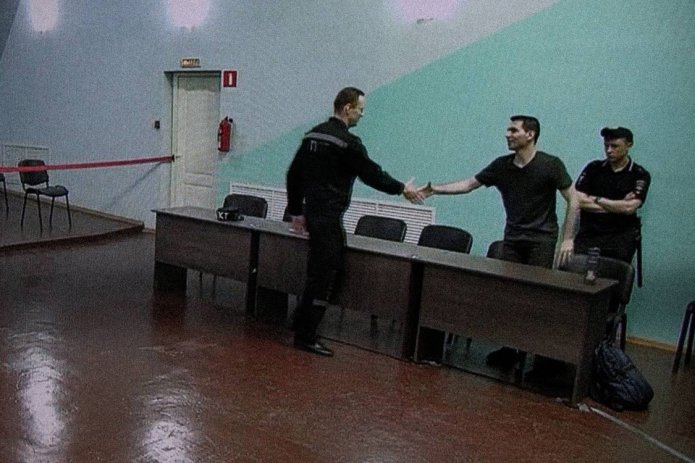
The co-founder of the «Omsk Civilians’ Association» Nikolay Rod’kin said that a criminal case was initiated against him due to his support of Navalny and his anti-war stance. He was searched by law enforcement.
In Krasnodar, a city in southern Russia, activist Roman Taganov was beaten by an unknown person wearing a t-shirt with pro-war symbols; the former was diagnosed with hematoma. The attacker demanded the activist «not to post anything on the Internet.»
Eco-activist Olga Kuzmina, who was protesting against cutting down trees in Moscow, was assigned involuntary psychiatric treatment.
Moscow politician Yuliya Galyamina was reinstated to her position at the Russian Presidential Academy of National Economy and Public Administration in court, however, in September she was once again suspended.
«Extremist Organizations»
 In August, law enforcement conducted searches in the homes of Jehovah’s Witnesses on the island of Sakhalin, in Vladimir Oblast in Central Russia, and in the city of Barnaul in Siberia.
In August, law enforcement conducted searches in the homes of Jehovah’s Witnesses on the island of Sakhalin, in Vladimir Oblast in Central Russia, and in the city of Barnaul in Siberia.
Ivan Sorokin and Andrei Zhukov, representatives of the religious denomination from Khanty-Mansi Autonomous Okrug in Siberia, were fully acquitted in court. Believers from other cities (Yaroslavl, Novosibirsk, Birobidzhan, Orenburg, Knyaze-Volkonsk) were sentenced to probation. Their fellow believers from the cities of Bikin and Solikamsk were fined, and in Kemerovo Oblast and Vladimir Oblast Jehovah’s Witnesses were given prison sentences.
Large fines and prison sentences were also given to five Scientologists from St. Petersburg, although they were all released due to their long-term confinement in a pre-trial detention center. A «citizen of the USSR» from Krasnoyarsk, a major city in Siberia, was given a suspended sentence of six years.
Repressions on the Territory of the Annexed Crimea
In August, Russian law enforcement carried out an entire series of searches and «inspections of premises» in the homes of Crimean Tatar activists, as well as Jehovah’s Witnesses who live on the peninsula.
Six Crimean Tatars were arrested in a new case against «Hizb ut-Tahrir, ” an Islamic fundamentalist political organization. The 22 activists who came to support them outside the court building were sent to a special detention center for a period of one to seven days for administrative offenses.
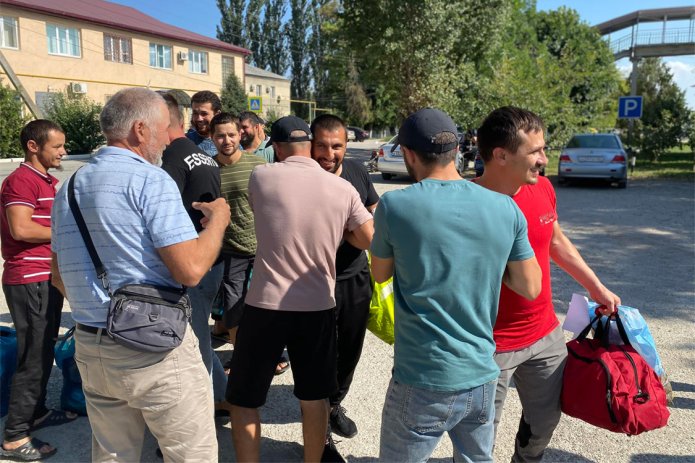
The Investigative Committee of the Russian Federation refused to initiate a criminal case on the death of Jemil Gafarov, a Crimean Tatar who died in a detention center. Irina Danilovich, a civil rights activist who was transferred from Crimea to a Russian prison, is continuously refused medical care.



